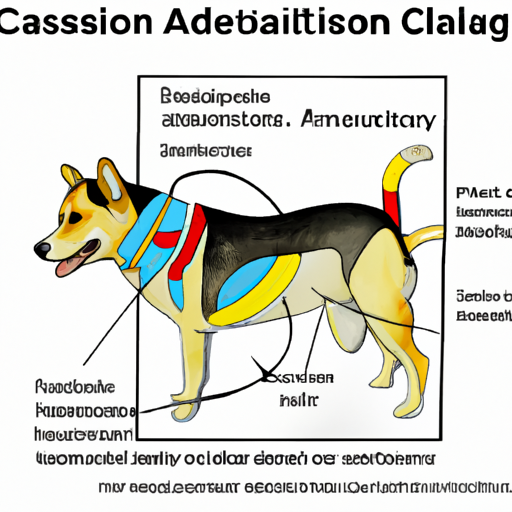As a caregiver, it’s normal to be concerned about any changes to your dog’s body, especially when it involves areas as sensitive as your dog’s testicles. If you’ve noticed that your dog’s balls are black, you’re probably wondering why. Is it a cause for concern? Is it normal? What should you do next? This guide will address these questions and more.
Understanding Canine Anatomy and Color Changes
Understanding your dog’s anatomy can help you identify when something is amiss. The skin around your dog’s testicles, also known as the scrotum, is usually pigmented, meaning it can appear darker than the rest of your dog’s skin.
- Natural Pigmentation: It’s not uncommon for a dog’s testicles to darken as they age. This is due to an increase in melanin, the pigment responsible for skin color. This is particularly true for dogs with darker fur.
- Hormonal Changes: As dogs mature, their hormone levels can change, leading to a darkening of the skin around the testicles. This is perfectly normal and nothing to be concerned about.
- Health Issues: In some cases, a darkening of your dog’s testicles can be a sign of a health problem. If the color change is accompanied by other symptoms such as swelling, discomfort, or a change in behavior, it’s time to consult your vet.
Identifying Potential Health Problems
If you notice a drastic change in the color of your dog’s testicles, it’s important to monitor for other signs of potential health problems. Here are a few things to watch out for:
- Swelling or enlargement of the testicles
- Changes in your dog’s behavior (like restlessness)
- Lack of appetite
- Excessive licking of the area
- Discharge or bleeding
If your dog is showing any of these symptoms, seek veterinary attention immediately.
Common Medical Conditions
Several health conditions can cause your dog’s testicles to turn black:
- Testicular Tumors: These are common in older, unneutered dogs. They can cause the testicles to swell and change color.
- Hyperpigmentation: This is a condition where the skin darkens due to an increase in melanin. It can occur due to various reasons including allergies, skin infections, or underlying diseases.
- Dermatitis: This is an inflammation of the skin which can be caused by irritants, allergies, or infections.
| Condition | Symptoms | Treatment |
|---|---|---|
| Testicular Tumors | Swelling, color change | Surgery, chemotherapy |
| Hyperpigmentation | Darkening of the skin, itching | Treat underlying condition |
| Dermatitis | Redness, itching, swelling | Steroids, antibiotics, removal of irritants |
Preventive Measures and Care
As a caregiver, you play an important role in maintaining your dog’s health. Here are some preventive measures and care tips:
- Regular Check-ups: Regularly check your dog’s testicles for any changes in size, shape, or color.
- Neutering: Neutering your dog can prevent testicular cancers and other health issues.
- Regular Vet Visits: Regular vet visits can help catch potential health problems early.
- Good Hygiene: Keeping your dog clean can prevent infections that may lead to skin discoloration.
Frequently Asked Questions (FAQs)
1. Why has my dog’s scrotum turned black?
It could be due to natural pigmentation, hormonal changes, or a health issue. If you’re concerned, it’s best to consult your vet.
2. Is it normal for a dog’s testicles to change color?
Yes, it can be normal, especially as dogs age or undergo hormonal changes. However, a drastic color change can also be a sign of a health problem.
3. Should I be worried if my dog’s testicles have changed color?
If the color change is accompanied by other symptoms like swelling, discomfort, or behavior changes, it’s best to consult your vet.
4. How can I prevent my dog’s testicles from turning black?
Regular check-ups, neutering, regular vet visits, and good hygiene can help maintain your dog’s health and prevent potential issues.
Remember, as a caregiver, it’s always best to err on the side of caution. If you’re concerned about any changes to your dog’s body, don’t hesitate to consult your vet. They can provide guidance and help ensure your furry friend stays healthy and happy.



